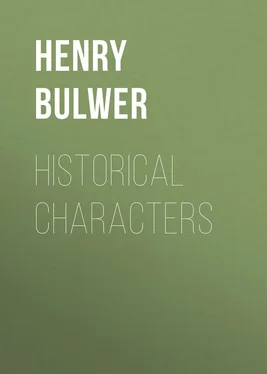Henry Bulwer - Historical Characters
Здесь есть возможность читать онлайн «Henry Bulwer - Historical Characters» — ознакомительный отрывок электронной книги совершенно бесплатно, а после прочтения отрывка купить полную версию. В некоторых случаях можно слушать аудио, скачать через торрент в формате fb2 и присутствует краткое содержание. Жанр: foreign_antique, foreign_prose, на английском языке. Описание произведения, (предисловие) а так же отзывы посетителей доступны на портале библиотеки ЛибКат.
- Название:Historical Characters
- Автор:
- Жанр:
- Год:неизвестен
- ISBN:нет данных
- Рейтинг книги:3 / 5. Голосов: 1
-
Избранное:Добавить в избранное
- Отзывы:
-
Ваша оценка:
- 60
- 1
- 2
- 3
- 4
- 5
Historical Characters: краткое содержание, описание и аннотация
Предлагаем к чтению аннотацию, описание, краткое содержание или предисловие (зависит от того, что написал сам автор книги «Historical Characters»). Если вы не нашли необходимую информацию о книге — напишите в комментариях, мы постараемся отыскать её.
Historical Characters — читать онлайн ознакомительный отрывок
Ниже представлен текст книги, разбитый по страницам. Система сохранения места последней прочитанной страницы, позволяет с удобством читать онлайн бесплатно книгу «Historical Characters», без необходимости каждый раз заново искать на чём Вы остановились. Поставьте закладку, и сможете в любой момент перейти на страницу, на которой закончили чтение.
Интервал:
Закладка:
“I beg then to assure those who, dreading what they term my ambition, never cease their slanders against my reputation, that I will never disguise the object to which I have the ambition to pretend.
“Owing, I presume, to the false alarm caused by my supposed pretensions to the see of Paris, stories have been circulated of my having lately won in gambling houses the sum of sixty or seventy thousand francs. Now that all fear of seeing me elevated to the dignity in question is at an end, I shall doubtless be believed in what I am about to say. The truth is, that, in the course of two months, I gained the sum of about thirty thousand francs, not at gambling houses, but in private society, or at the chess-club, which has always been regarded, from the nature of its institution, as a private house.
“I here state the facts without attempting to justify them. The passion for play has spread to a troublesome extent. I never had a taste for it, and reproach myself the more for not having resisted its allurements. I blame myself as a private individual, and still more as a legislator who believes that the virtues of liberty are as severe as her principles: that a regenerated people ought to regain all the austerity of morality, and that the National Assembly ought to be directed towards this vice as one prejudicial to society, inasmuch as it contributes towards that inequality of fortune which the laws should endeavour to prevent by every means which do not interfere with the eternal basis of social justice, viz., the respect for property.
“You see I condemn myself. I feel a pleasure in confessing it; for since the reign of truth has arrived, in renouncing the impossible honour of being faultless, the most noble manner we can adopt of repairing our errors is to have the courage to acknowledge them.
“Talleyrand A. E. d’Autun.”From this document we learn that the Bishop of Autun, notwithstanding his labours in the Assembly, was still a gay frequenter of the world: to be found pretty frequently at the chess-club, as well as in private society; and, though he lamented over the fact, a winner at such places of thirty thousand francs within two months. We also learn that he abandoned at this moment the idea of professional advancement, in order to maintain unimpeached the motives of his political conduct; and we may divine that he looked for the future rather to civil than to ecclesiastical preferment.
The most striking portion of this document, however, is the tone and style – I may almost say the cant – which prevails towards its conclusion. But every epoch has its pretensions: and that of the period which intervened between May, 1789, and August, 1792, was to decorate the easy life of a dissolute man of fashion with the pure language of a saint, or the stern precepts of a philosopher. “ Le dire ,” says old Montaigne, “ est autre chose que le faire: il faut considérer le prêche à part, et le prêcheur à part .” 17 17 “Saying is quite a different thing from doing: the preaching and the preacher must be considered apart.”
And now, or but a little after this time, might have been seen an agitated crowd, weeping, questioning, and rushing towards a house in the Rue de la Chaussée d’Antin. It was in the first days of April, and in that house – receiving through the open windows the balmy air which for a moment refreshed his burning forehead, and welcoming yet more gratefully the anxious voice of the inquiring multitude – lay the dying Mirabeau, about to carry into the tomb all the remaining wisdom and moderation of the people; and, as he himself sadly and proudly added, all the remaining fragments of that monarchy which he had shown the power to pull down and had flattered himself he might have the power to reconstruct. By his death-bed stood the Bishop of Autun. It was a curious combination of circumstances which thus brought together these two personages, whose characters were essentially different, but whose position was in some respects the same. The one was eloquent, passionate, overbearing, imprudent; the other cool, urbane, logical, and cautious. But both were of illustrious families, endowed with great abilities, ejected from their legitimate place in society. Both also were liberal in their politics, and this from vengeance and ambition, as well as from principle and opinion. Aristocrats allied with a democratic faction; monarchists in desperate conflict with those by whom monarchy was most held in reverence; they had engaged in a battle for moderation with extreme auxiliaries and extreme opponents. Mirabeau, the fifth child, but who became, by a brother’s death, the eldest son of the Marquis de Mirabeau (a rich proprietor of a noble house in Provence), had been, when very young, married to a wealthy heiress, and intended for the profession of arms. Nevertheless, quitting his profession, separated from his wife, constantly involved in scrapes – now for money, now for love – he had led a bachelor’s life of intrigue, indigence, and adventure, up to the age of forty, alternately the victim of his own wild nature and of the unwise and absurd severity of his father, whose two pursuits in life were persecuting his family and publishing pamphlets for the benefit of mankind. Thus, frequently in confinement – always in difficulties (the first and last means of correction with the old marquis being to procure a “ lettre de cachet ,” and to stop his son’s allowance), the Comte de Mirabeau had supported himself almost entirely by his talents, which could apply themselves to letters, though action was their proper sphere.
During a short interval in his various calamities – an interval which he had passed at Paris in a desperate effort to better his condition – he had become acquainted with M. de Talleyrand, who, struck by his abilities and affected by his misfortunes, recommended him to M. de Calonne, at whose suggestion he was sent by M. de Vergennes, then minister of foreign affairs, on a sort of secret mission into Germany, just prior to the Great Frederick’s death. From this mission he returned when France was being agitated by the convocation of the “notables,” speedily succeeded by that of the States-General. He saw at a glance that an era was now approaching, suited to his eminent talents, and in which his haughty but flexible character was likely to force or insinuate its way: his whole soul, therefore, was bent upon being one of that assembly, which he from the first predicted would soon command the destinies of his country.
Certain expenses were necessary to obtain this object, and, as usual, Mirabeau had not a farthing. The means which he adopted for procuring the money he required were the least creditable he could have devised. He published a work called “The Secret History of the Court of Berlin,” a work full of scandal, public and private, and betraying the mission with which he had recently been intrusted. 18 18 A defence has been set up for Mirabeau, viz., that the work, though written by him, was published without his knowledge by a bookseller’s wife, his mistress. But besides the utter improbability of this story, there is the fact that Mirabeau remained until his death on the best terms with the person who would thus have betrayed a most sacred trust and merited his bitterest contempt and indignation.
The government was naturally indignant; a prosecution was instituted against him before the Parliament of Paris; M. de Montmorin, and others, by whom he had previously been patronised, told him plainly they wished to drop his acquaintance.
Through all these disgraceful difficulties Mirabeau scrambled. He denied that the work was published by his authority.
Rejected from their sittings by the nobility of Provence, who decreed that, having no fiefs of his own, and being merely invested with his father’s voice, he had no right to sit among the nobles, he became the successful candidate of the tiers-état for Aix; and at the meeting of the States-General stood before the ministry which had accused, and the aristocracy which had repudiated him, a daring and formidable enemy.
Читать дальшеИнтервал:
Закладка:
Похожие книги на «Historical Characters»
Представляем Вашему вниманию похожие книги на «Historical Characters» списком для выбора. Мы отобрали схожую по названию и смыслу литературу в надежде предоставить читателям больше вариантов отыскать новые, интересные, ещё непрочитанные произведения.
Обсуждение, отзывы о книге «Historical Characters» и просто собственные мнения читателей. Оставьте ваши комментарии, напишите, что Вы думаете о произведении, его смысле или главных героях. Укажите что конкретно понравилось, а что нет, и почему Вы так считаете.












